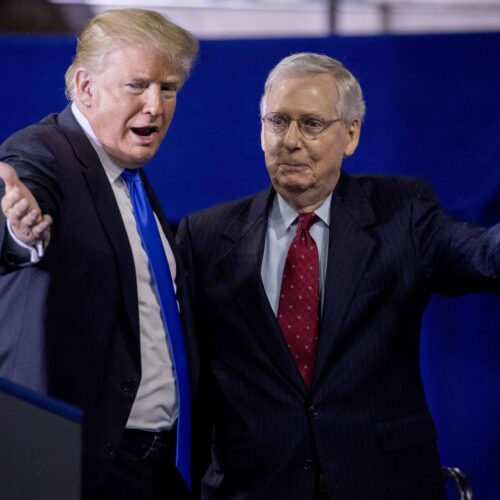Introduction
On Thursday, the Federal Election Commission is supposed to meet in public session.
It won’t. That’s because the FEC no longer has enough commissioners to conduct high-level business, including a most fundamental responsibility: enforcing campaign finance laws so politicos don’t cheat voters.
The U.S. Senate and President Donald Trump could easily appoint new commissioners to the FEC and soon end the agency’s involuntary trip through limbo, which has now entered its second week.
Restart ingredients are certainly present: Senate Democrats have recommended Shana Broussard, an attorney and executive assistant to longtime Commissioner Steven Walther, to Trump for nomination, three sources familiar with the FEC nominating process confirmed to the Center for Public Integrity. (Broussard and Walther did not respond to requests for comment.)
Broussard, if nominated by Trump and confirmed by the Senate, would become the first African American to serve on the six-member FEC, which today only has three commissioners — one short of a needed quorum.
Meanwhile, the Republican-controlled Senate could at any moment consider Trump’s lone FEC nominee to date, Texas attorney Trey Trainor, who’s languished for nearly two years without even a confirmation hearing.
The hang-up, perhaps predictably? Disagreement among Senate Republicans and Democrats, as well as the White House, on how to proceed.
Senate Republicans want to clean house and appoint six new commissioners.
Consider that the three remaining FEC commissioners — Chairwoman Ellen Weintraub, D; Commissioner Caroline Hunter, R; and Walther, an independent — collectively have served 29 years past the expiration of their six-year terms. The FEC’s three other commissioner slots are vacant following the resignation Sept. 1 of Vice Chairman Matthew Petersen, a Republican.
These final three are allowed to indefinitely occupy their commissioner seats until a president offers new nominees to replace them, something presidents George W. Bush, Barack Obama and Trump each has failed to do, at least in part.
The office of Senate Majority Leader Mitch McConnell, R-Ky., declined to answer emailed questions about the FEC situation.
But, “there is an ongoing effort to fill all six FEC commissioner seats,” said a Republican Senate staffer familiar with the FEC nomination process, who declined to be named in order to speak candidly. “To do that though, Sen. [Chuck] Schumer and Senate Democrats must replace the two longtime Democratic holdovers. A clean slate of members will go a long way toward fixing some of the perceived dysfunction at the commission.”
Some key congressional Democrats, meanwhile, are pushing for what would likely be a speedier, if less sweeping solution.
“I hope the Senate will consider a bipartisan pair of nominees, as it has in the past, to restore a quorum,” Rep. Zoe Lofgren, D-Calif., chairwoman of the Committee on House Administration, which oversees the FEC, told Public Integrity. She plans to conduct an FEC oversight hearing — the first since 2011 — later this year.
Schumer’s office declined to answer specific questions. It released a one-sentence statement: “Congress should address this issue quickly because we need a fully functioning FEC.”
No more than three FEC commissioners may come from one party. Tradition — often, but not always, honored — provides that a president nominate FEC commissioners two at a time, one Democrat, one Republican.
Nominating and appointing one Republican and one Democrat in tandem now would give liberals an institutional advantage, with two Democrats and a left-leaning independent in Walther working with only two Republicans. FEC Democrats in recent years have generally pushed for stronger campaign finance regulations and more rules while Republicans have taken a much more laissez-faire tack, prioritizing the rights of political actors to use money to advance political speech.
Trump — not exactly a slave to political convention — could torch tradition altogether.
At an extreme, Trump could ignore Senate recommendations and float six FEC nominees of his own choosing. Trump wouldn’t even need to nominate Democrats — he could offer the Senate three Republicans and three Libertarians. Or three Republicans and three Trump-loving independents. Trump could even decide to nominate no commissioners at all to the FEC, which during the past four years has processed (and closed without issuing penalties) several complaints against Trump’s campaign committee and close affiliates.
Possible? Almost anything is possible. Likely? No, said former Republican FEC Chairman Trevor Potter, now president of the reformist Campaign Legal Center.
Trump has little to gain from “picking a fight” with Senate Democrats over something such as FEC nominations, and something resembling an FEC nomination status quo is more plausible, Potter said.
But Lee Goodman, a Wiley Rein LLP law firm partner and another former Republican FEC chairman, says Trump has a rare opportunity to shape the FEC with six new commissioners, and his sense is that the president will “insist” on doing so. Such a move would avoid the hassle of “revisiting commission nominations on a seat-by-seat basis” and avoid any one party or group of like-minded commissioners from enjoying more seats than another.
Who We Are
The Center for Public Integrity is an independent, investigative newsroom that exposes betrayals of the public trust by powerful interests.
“Congress set terms at six years for a reason and the current situation affords a good inflection point to honor the wisdom in Congress’s judgment,” Goodman said.
While the White House declined to address Public Integrity’s questions about nominating Broussard or, for that matter, a slate of six new commissioners, a spokesman Tuesday called for Senate urgency.
“The president’s nominee, Trey Trainor, has been waiting to be confirmed for two years, and the Senate must now move quickly so the FEC can achieve a quorum,” Deputy Press Secretary Steven Groves told Public Integrity. “The president has repeatedly taken steps to protect the integrity of our elections and the confirmation of his nominee would be one more.”
Weintraub, the current FEC chairwoman, has long maintained that Trump is an omnipresent obstacle to election integrity. She’s recently chided him for his potential dealings with foreign entities and statements on voter identification and claims of voter fraud.
Her agency’s semi-shutdown — the first since a six-month stoppage in 2008 — has hardly cowed her.
To wit, Weintraub has scheduled for Sept. 17 a daylong symposium on disinformation at FEC headquarters in Washington, D.C. The stated goal of the “not official FEC event,” per an invitation: to “identify effective policy approaches and practical tools that can minimize the disruption and confusion sown by fraudulent news and propaganda in the 2020 campaign.”
Sen. Mark Warner, D-Va., and Michael Chertoff, Department of Homeland Security secretary under Bush, are scheduled to participate, along with representatives of Facebook, Twitter and other tech firms, Weintraub said.

Weintraub said the FEC’s more than 300 employees are attending to their work the best they’re able, particularly those involved with the agency’s unabated campaign transparency functions, such as reviewing and publishing political committees’ financial filings.
“The Senate — I certainly hope we have a quorum by the end of the year,” she said, adding that in the meantime, “we’re trying to keep the ship straight, afloat.”
Color Rep. Derek Kilmer, D-Wash., disgusted with the entire situation.
“The referees just left the field. That should be troubling to every American,” Kilmer said. “We shouldn’t make it easier for politicians to cheat.”
And the notion that the FEC is receiving more than $70 million annually but can’t approve investigation, penalize political scofflaws or even conduct official public meetings? “It should piss off every American taxpayer,” he said.
Commissioner quorum or no quorum, he says the FEC is largely nonfunctional — philosophically polarized commissioners routinely bicker and often fail to reach the minimum four votes needed to affirm a penalty, create a new rule or advance an investigation.
The FEC, Kilmer contends, should be replaced by a five-member commission immune to deadlocks. He’s sponsoring a bill that would make law this and a slew of other changes, including how presidents selected FEC commissioners. But at this moment, Kilmer concedes, his reform bill isn’t likely going anywhere in a split Congress, controlled in the lower chamber by Democrats and the upper chamber by Republicans.
“So for now, the president needs to act and the Senate needs to act” to provide the FEC a quorum, he said. “Inaction can’t be an option.”
Read more in Money and Democracy
Money and Democracy
They promise to help families of fallen officers. But they’re mostly paying telemarketers.
A union-backed police charity spends just a sliver of its money on those it purports to serve





Join the conversation
Show Comments